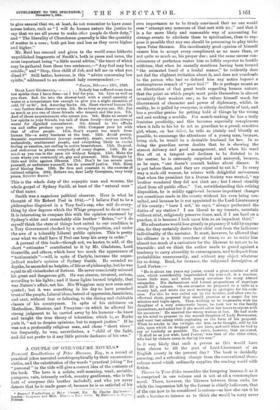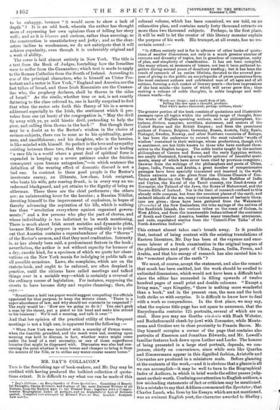A COUPLE OF ONE-VOLUME NOVELS.* Personal Recollections of Peter Stonnor,
Esq., is a record of practical jokes narrated autobiographically by their unconscious victim, and the substitution of the words "practical joking" for " personal " in the title will give a correct idea of the contents of the book. The hero is a sedate, well-meaning, weak, amiable, pompous, vain, intensely owlish, country gentleman, who is the butt of everyone (his brother included), and who yet never detects that he is made game of, because he is so satisfied of his
• Personal R•coUccUons of Ptt,r EN. By Charles Blatherwic', London : Cliarnian and Hall. TherLs n roc:). s.o.00. By Harriette A. Eep.kr. Putnam. own importance as to be firmly convinced that no one would ever " attempt any nonsense of that sort with ME ;" and that it
is a far more likely and reasonable way of accounting for strange events to attribute them to spiritualism, than to sup- pose it possible that any one should be presuming to play tricks upon Peter Stonnor. His inordinately good opinion of himself causes him to accept every compliment as no more than, or not quite so much as, his proper doe ; and the same serene con- sciousness of perfection makes him so loftily superior to hostile criticism, that when he casually mentions having been termed " the animated fossil of a feudal manor," he evidently does not feel the slightest irritation about it, and does not vouchsafe to the person who had so defined him any notice beyond a contemptuous remark of " poor fool !" He is perhaps meant as an illustration of that great truth regarding human nature, that the point on which people most pride themselves is almost invariably their weakest one; so he values himself much for discernment of character and power of diplomacy, whilst, in reality, he is gulled by everyone, is utterly destitute of tact, and. has a peculiar genius for getting hold of things by the wrong end and making a muddle. For match-making he has a truly feminine proclivity, and this becomes especially conspicuous when it falls to his lot to act as guardian to a proud, sensitive
girl, whom, on her dam!, he tells as plainly and bluntly as possible, to encourage the attentions of a young man, because, being rich, he would be a desirable husband for her. In so doing the guardian never doubts that he is showing the utmost delicacy and good management, and when his ward flies off at a tangent and declines to be dictated to in
the matter, he is extremely surprised and annoyed, because, as he says, "one doesn't consult babies about dinner. It
is put before them, and they are expected to eat it." In every way a male old woman, he relates with delightful seriousness that when the president for a Dorcas Society was wanted, " my
brother wondered they did not elect me ; but I stood steadily aloof from all public office." Yet, notwithstanding this retiring disposition, he is mildly aggrieved because important changes are sometimes made in the county without his even being con- sulted, and because he is not appointed to the Lord-Lieutenancy of his county ; " have I not," he says, " always performed the duties of my station ? I am liberal to my tenants, entertain without stint, religiously preserve foxes, and, if I am hard on a poacher, it is because I look upon him as an impudent thief." His adventures would lose greatly in piquancy if told by anyone else, for they certainly derive their chief zest from the ludicrous individuality of the narrator. It must, however, be allowed that his silliness is a little overdone at times, so as to make him almost too much of a caricature for the likeness to nature to be traceable ; and we think the author needs to guard against a tendency to carry absurdity to extravagance, and to depart from probabilities unnecessarily, and without any object whatever for so doing. Read, for instance, the subjoined description of Lord. Forton :—
" Heil; about ten years my junior, sowed a great number of wild oats, which considerably impoverished his rent-roll, is a careless, brave little man, and when young notorious for many absurd escapades. His declarations and formal propositions of marriage would fill a volume. On one occasion he proposed to a belle at a county ball, and wrote the next morning to apologise for his rude- ness. For this he was called out by the brother, and after two in- effectual shots, proposed they should practise at a target for ten minutes and begin again. Then, wishing to be impressive with the daughter of a very aristocratic house, he took her to the family mausoleum, and asked her if she would allow her bones to repose with his ancestors ! He married the wrong woman at last. He had made up his mind to propose to the second daughter of Lady Bowmaster, and went fast asleep while cogitating on the form of his proposal. When he awoke in the twilight she was, as he thought, still by his side, upon which he dropped on one knee, and said what be had to say as tenderly as possible. The voice, however, that answered, ' It shall be as you wish, Lord Forton,' was that of the elder sister, who had by chance come in during his nap."
Is. it very likely that such a person as this would have been chosen to fill the post of Lord-Lieutenant of an English county in the present day ? The book is decidedly amusing, and a refreshing change from the conventional three-
volume novel which ordinarily supplies the reading world with fiction.
Thorns in Your Sides resembles the foregoing inasmadt as it is comprised in one volume and is not at all a commonplace novel. There, however, the likeness between them ends, for while the impression left by the former is chiefly ludicrous, that of the one now to be considered is serious—as how else can it be with a heroine so intense as to think she would be sorry never to be unhappy, because " it would seem to show a lack of depth " ? It is an odd book, wherein the author has thought
more of expressing her own opinions than of telling her story well ; and as it is bizarre and curious, rather than amusing; as the construction is unsatisfactory and jerky ; and as the char- acters incline to woodenness, we do not anticipate that it will achieve popularity, even though it is undeniably original and a work of ability.
The scene is laid almost entirely in New York. The title is a text from the Book of Judges, foretelling how the Israelites were to suffer from the Canaanites ; which text is made to apply to the Roman Catholics from the South of Ireland. According to oue of the principal characters, who is himself an Ulster Pro- testant and a rector in New York, " England and America are the lost tribes of Israel, and these Irish Romanists are the Canaan- ites who, the prophecy declares, shall be thorns in the sides of Israel." As the simile, whether true or not, is not exactly flattering to the class referred to, one is hardly surprised to find that when the rector sets forth this theory of his in a sermon addressed especially to the Irish, the sentiment which it pro- vokes from one (at least) of the congregation is, " May the divil fly away with ye, ye mild hiretic divil, pretending to help the poor, and calling thim thorns in the back !" But though there may be a doubt as to the Rector's wisdom in the choice of sermon-subjects, there can be none as to his spirituality, good- ness, and unselfishness ; and his daughter, who is the heroine, is like-minded with himself. So perfect is the love and sympathy existing between these two, that they are spoken of as leading "a rare life in a world where a great deal of spiritual force is expended in keeping up a severe patience under the friction consequent upon human antagonism,"—in which sentence the definition of the wearing effect of domestic discord is not a bad one. In contrast to these good people is the Rector's inveterate enemy, an illiterate, low-class, Irish emigrant, who beats his wife, gets roaring drunk, is in every way an un- redeemed blackguard, and yet attains to the dignity of being an alderman. These three are the chief performers ; the others are: an uninteresting lover for the heroine ; a Russian Nihilist, devoting himself to the improvement of explosives, in hopes of thereby advancing the aspiration of his life, which is nothing less than " revolution everywhere against organised govern- ments ;" and a few persons who play the part of chorus, and whose individuality is too indistinct to be worth mentioning. There is much about Irish secret societies and dynamite plots, because Miss Keyser's purpose in writing evidently is to point out that America contains a superabundance of the " thorns " of the Rector's sermon, and that they need eradication. Intensity is, as has already been said, a predominant feature in the book ; nevertheless, the author is not without capacity for humour of a dry, caustic kind, for a specimen of which we quote her obser- vations on the New York mania for indulging in public talk on all possible occasions. Laws, she complains, which are on the statute-book, and ought to be enforced, are often despised in practice, until the citizens have called meetings and talked things over in a sociable way—which is certainly a reversal of the ordinary course of legislation. For instance, supposing the streets to have become dirty and require cleansing; then, she says :—
" Sometimes a bold tax-payer would suggest compelling the officials appointed for that purpose, to keep the streets clean. There is a super-abundance of law, and why should not contracts be respected ?' The reply would be How are we going to do it ? You can't grab a man by the throat, pat a pistol to his bead and make him attend to his business ! We'll call a meeting, and talk it over.' "
And that her opinion of the practical utility of these frequent meetings is not a high one, is apparent from the following :-
"When New York was troubled with a scarcity of Croton water, when the irascible grumbled, and the meek were sad, meeting upon meeting was held to discuss, in fact, whether water might come under the bead of a real necessity, or one of those superfluous luxuries that might be dispensed with. Discnsaion was also had con- cerning the point whether it were better and cheaper to bring it from the sources of the Nile, or to utilise any water-coarse nearer home."















































 Previous page
Previous page